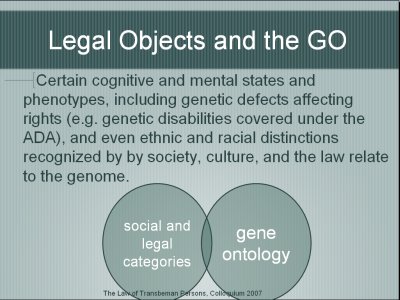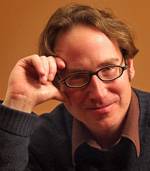An Outline for the Legal Ontology of Personhood:
The Transbeman Example
David Koepsell, Ph.D.
Page 3 of 3
There are a number of objections and problems. One I hear most is: Isn't this just science? I'm willing to say it's a part of science but it's not the whole story. Science does a good job at gathering evidence about the nature of reality but sometimes does not express it in languages that are sufficiently robust to share among sciences, and this is the role of ontology.
We actually find in the scientific world people in distinct sciences using vocabularies including the same words employed in very different ways - and that's a real problem in the sciences that ontology is helping to solve. It will also, I believe, help us to solve these problems in bioethics and the law. We should, however, continue the project into other realms or other scientific pursuits.

Image 6
Another question I get is: "Isn't this terribly complicated?" You betcha! I'm not saying it's easy but I think, as I mention, that we actually have a good basis from which to begin. I believe the law is one of the most robust ontologies out there that nobody has ever really successfully mined for a lot of important ontological terms. Much of my work begins with the law which is a very good place to start. The law has had to grapple with these issues in a very practical way; long before philosophers had to. Of course, when things get practical, philosophers start to shy away.
What are the implications for transbemanism? Social and biological ontologies are developing and considering them necessary conditions for personhood. What must yet be done is to define those sufficient conditions separate and apart from existing ontologies. Existing legal ontologies provide a very useful point of departure. Biology alone is overbroad and insufficient in defining legally and socially relevant categories of person but we are going to have to grapple with this. We heard how science is leading to this necessarily as with the problems of space law. If we don't anticipate and start to grapple with these as scientific questions we are going to be in a lurch when the first legal and social challenges to these things emerge. Now is the time, a very auspicious time to be dealing with this question and I'd like to urge you to consider this from an ontological standpoint.
Bio
 David Koepsell, J.D., Ph.D. is a Research Assistant Professor at the University at Buffalo, New York. Dr. Koepsell directs the university's campus-wide Research Ethics course, and is involved in developing and teaching in the graduate education department's new Masters certificate program entitled “Science and the Public,” co-sponsored by the educational not-for-profit Center for Inquiry, with which he is also affiliated. He also developed a course at UB entitled “Law and Technology” in the Social Sciences Interdisciplinary program. David's research interests focus on the nexus of ethics, law, and science.
David Koepsell, J.D., Ph.D. is a Research Assistant Professor at the University at Buffalo, New York. Dr. Koepsell directs the university's campus-wide Research Ethics course, and is involved in developing and teaching in the graduate education department's new Masters certificate program entitled “Science and the Public,” co-sponsored by the educational not-for-profit Center for Inquiry, with which he is also affiliated. He also developed a course at UB entitled “Law and Technology” in the Social Sciences Interdisciplinary program. David's research interests focus on the nexus of ethics, law, and science.